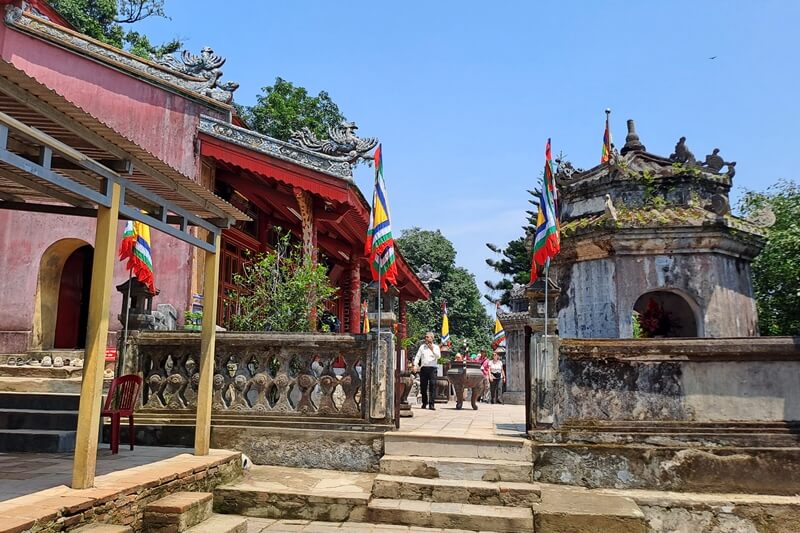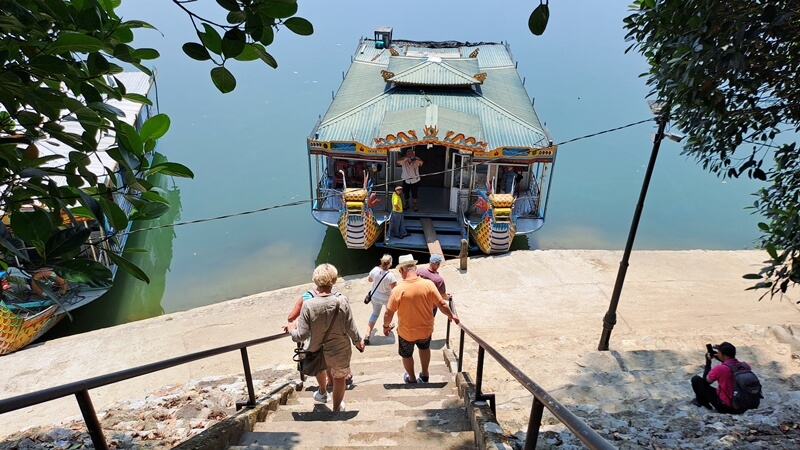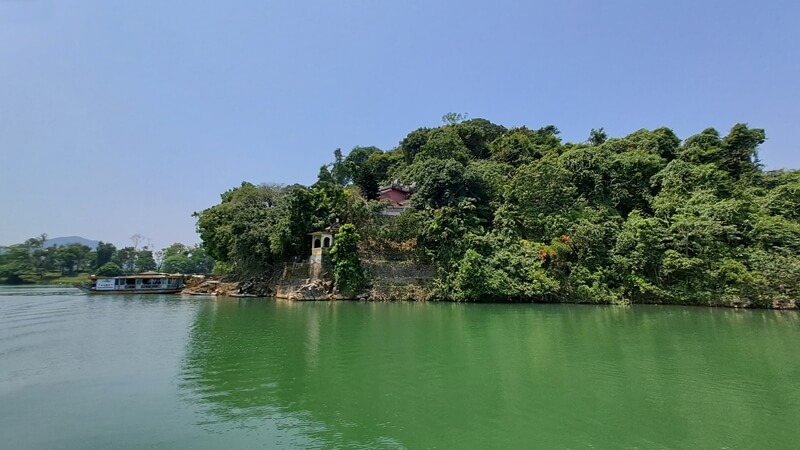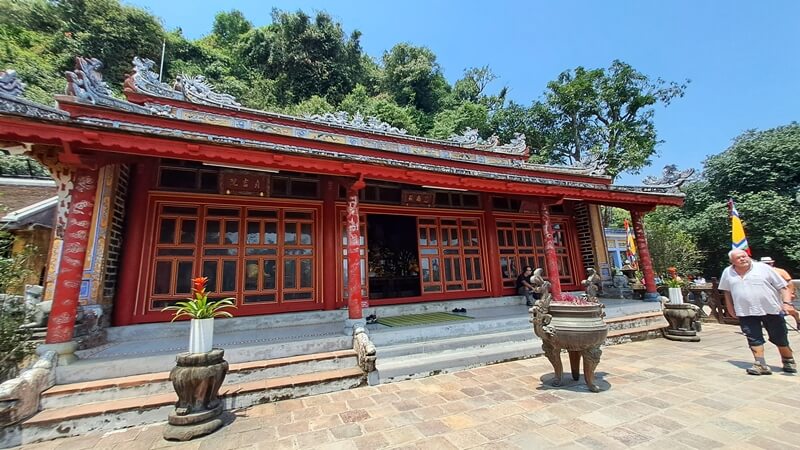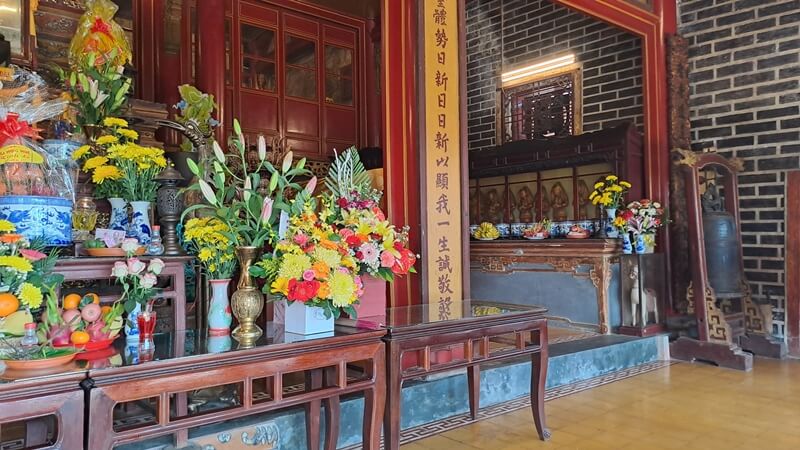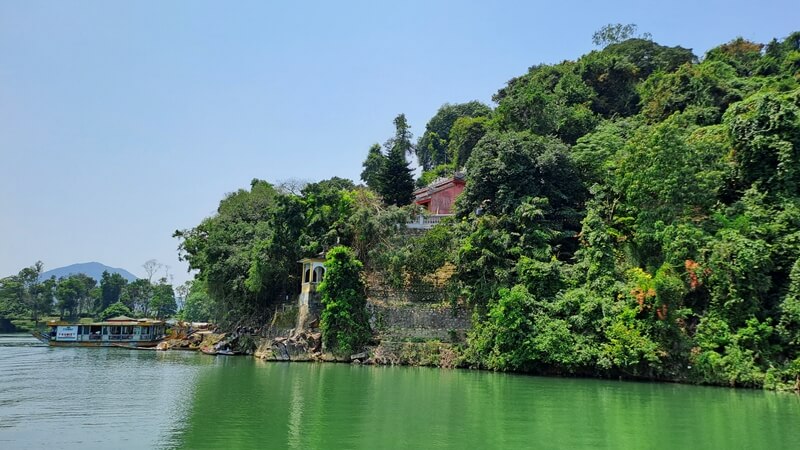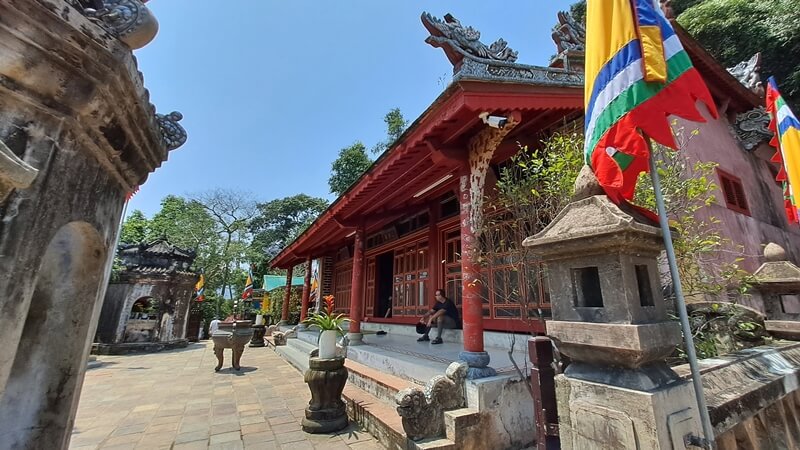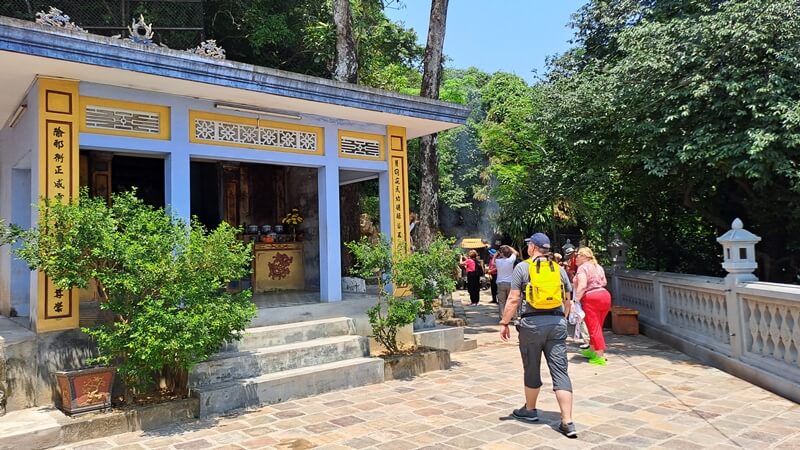Hon Chen Temple
Hon Chen Temple, also known as Hue Nam Temple, is a unique spiritual tourism address in Hue City because of the belief in Mother Goddess worship and polytheism here. Annually, this sacred shrine attracts thousands of locals and tourists from all over to offer incense and worship.
Hon Chen Temple area is located right on the north bank of the Perfume River, about 8km west of Hue City. The shrine is located on Ngoc Tran Mountain of Cat Hai Village, Huong Tra District, Thua Thien Hue Province. Its back leans against the mountain, and its face looks at the Perfume River, reflecting itself on a calm river of water.
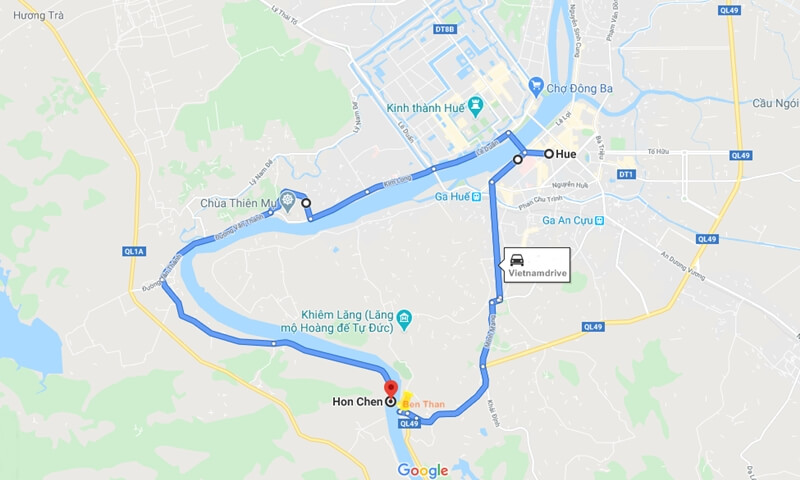
Currently, the road leading here is still difficult. Therefore, when wanting to visit Hon Chen Temple, many people use dragon boats departing from the city center. Or, use a car to travel to Than Wharf, a small ferry wharf located in Thuy Bang Village, on the opposite bank of the Perfume River from the Hon Chen Temple, then catch a ferry to this holy site.
With the two transportation methods above, I prefer to choose a dragon boat from the city center. Because with this option, I can have about 40-50 minutes each way to sit and relax on the river. Admire the peaceful natural scenery, the green tree-lined parks, the fruit-laden fruit gardens, and the roofs of houses hidden in the distance along both sides of the banks.
Many people believe that the section of the Perfume River right in from this temple is the deepest. That’s why the river water here seems clearer and greener. Therefore, when tourists take a boat to Hue Nam, you need to be very careful. Specifically, if you are traveling with children, make sure they do not run, jump, or misbehave for your safety.
Hon Chen Temple was built during the reign of King Dong Khanh (1885-1889), including a main hall and front yard. In particular, the front yard has a relatively small area, with a few shrines worshiping gods such as the Earth God, the guardian god, and even the spiritual souls who want to take refuge in a pure place.
Because the yard is small, if you want to take photos of the entire temple architecture, you can set the camera to 0.5x zoom mode.
Entering the main hall, it is a small wooden structure. Inside, it is decorated very solemnly, including the altar of the holy mother Thien Y A Na in the middle, and on both sides are deities, Bodhisattva, and Saint Quan Cong.
The worship of the holy mother, combining polytheism and Bodhisattva, has become one of the highlights of the Hon Chen temple. So when you enter the main hall, you will see many statues and altars arranged almost to fill the small main hall space.
Therefore, as a tourist, when entering, you should walk and speak softly, not take pictures inside, and not burn incense. That is like the respect you have for this spiritual place.
Stories about Hon Chen Palace:
The story about the name Hon Chen Temple:
1. The first hypothesis is that:
On the top of the hill, right behind the main hall, a patch of ground is concave, forming a natural bowl-like indentation. When it rains, water accumulates in the hole and looks like a bowl of water, so it is called “Hon Chen”.
However, according to our research, exploring this hill by road is very difficult. At the same time, we did not find any pictures or videos showing the depression on the mountain. Therefore, we think this idea is an unconvincing hypothesis about the origin of the name Hon Chen.
2. The second hypothesis is based on the following:
The shape of the mountain here is round, looking like an upside-down bowl on the north bank of the Perfume River. Therefore, local people call the temple of this mountain Hon Chen Temple, meaning the Jade Cup Temple in English.
This explanation seems more reasonable and convincing, and we agree with this hypothesis.
The spiritual story between Hue Nam Temple and King Dong Khanh:
Before being crowned king, Prince Nguyen Phuc Ung Duong once went to Hon Chen Shrine to pray and ask for a hexagram about his life.
Ung Duong was expected to become a king in the future. Indeed, in 1885, Ung Duong ascended the throne and took the reign name Dong Khanh.
To show gratitude to Holy Mother Thien Y A Na, King Dong Khanh had the temple rebuilt to be more spacious, with hardwood materials and durable adhesives.
The building built by King Dong Khanh is the main temple that still exists today. Although, through time and many renovations and repairs, the original structure and design are well-preserved in their original state.
On the second floor and behind the altar in the first main section, there is another altar for King Dong Khanh to commemorate his merit in building the temple.
Worshipping a king here adds another typical feature, which enriches the worshipping diversity at Hue Nam Temple: mother worship, Buddha worship, god praying, and king worship. It creates a unique highlight for any journey to visit this place.
Hon Chen Temple’s Festival:
Nowadays, many local people and pilgrims everywhere still believe that Hon Chen Temple is one of the most sacred places of prayer and worship in Hue City. Therefore, the shrine is carefully cleaned and scented with flowers every day.
In addition to daily solemn worship, every year at Hon Chen Temple, a festival is held to attract hundreds of people to participate. Annually, the Hue Nam Temple Festival takes place in the 7th lunar month, lasting 3-4 days. However, the official ceremony date is not fixed and changes depending on the year.
On this typical spiritual festival, you can see many dragon boats decorated brightly and beautifully, covering the long section of the Perfume River right in front of Hon Chen Temple. The dragon boats are the core means of transportation used during the festival.
In the temple, the sound of singing and praying echoed all the way to the riverbank and lasted throughout the festival days.
If you have an opportunity to come to Hue City on the 7th lunar month, please arrange a reasonable time to participate in this unique festival activity. Immersing yourself in the festival will be a different experience of a colorful indigenous cultural and religious activity.
-
Bike Parking
-
Parking Section

